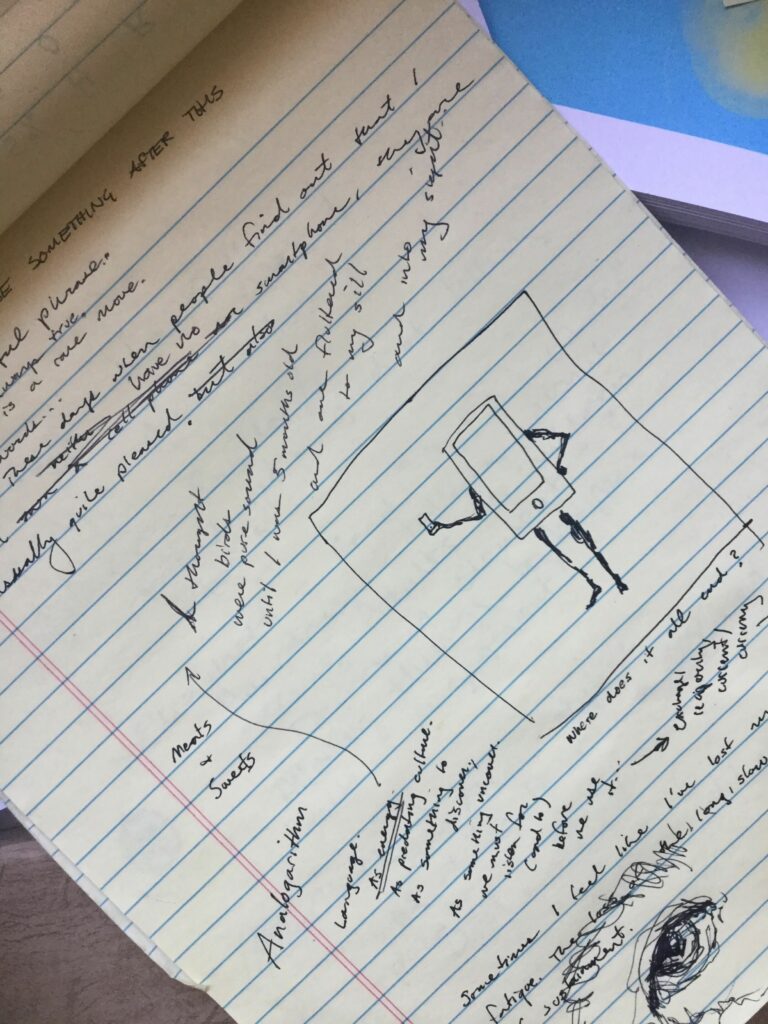
For our series Making of a Poem, we’re asking some poets to dissect the poems they’ve published in our pages. Michael Bazzett’s “Autobiography of a Poet” appears in our Spring issue, no. 243.
How did this poem start for you? Was it with an image, an idea, a phrase, or something else?
It was a phrase. I was sitting in my backyard, with a legal pad and a few books, including Fady Joudah’s Footnotes in the Order of Disappearance and After Ikkyu by Jim Harrison, which contains the line “I was born a baby, / what are these hundred suits of clothes I’m wearing?” I was thinking about dislocation and baby-logic, and object permanence, and the idea of first encountering something through a sense other than sight. Hearing a bird before you see it, for instance. Or how a visual stimulus like a leaf-shadow fluttering in the wind moves on the wall above a crib. In my baby-mind, I imagine that light-flicker as something animate, moving of its own accord. When does a baby stop engaging with stimuli as pure image or pure sound and begin to imagine what caused it? I’ve often wondered what it would be like to be able to reexperience the dreams we dream in utero, or in the first months of life before language, before we consciously encounter words and narrative structure. How would they be ordered? Where would the images come from? Do we bring anything with us from the other side? Are there things already written into us?
For some reason, I’d written down some notes on language on my legal pad: “Language as energy, as predating culture, as something to discover …” And “Language as energy” leaped out at me, and I wrote, “I thought birds were pure sound / until I was 5 months old / and one fluttered to my sill / and into my sight.”
I say I was “thinking about” the above things, but really they were thinking inside me. Or simmering. Or humming. I don’t know what the verb is, but it’s not thinking.
How did writing the first draft feel to you? Did it come easily, or was it difficult to write?
I came across the lines when I was typing up another poem from the pad, and I typed it up and played with the lineation and liked “I thought birds were pure / sound” as an initial first two lines, with the slant rhyme of bird/pure, the little head-fake that “pure” modifies “bird” (due to the enjambment) before it settles on “sound.” I liked the way it was moving, and tried to follow its sound, which led to “flutter” becoming “flicker,” echoed by “quick,” and “light” rhyming with “right.” It sounded kind of jaunty, so I just followed the voice.
The cigarettes arrived as a joke, but a joke that somehow included the final image, which surprised me and also felt pleasing and symmetrical, with the half rhyme of “curled” and “bird” echoing the opening stanza.
The whole thing came out pretty quickly, which happens sometimes. Not often.
The ensuing revisions were mostly just little tweaks. The biggest change was that “Having a smoke” became “Smoking a dart.” I heard it and I thought, Yeah! Get a few more consonants in there. The original title was “Ars Poetica,” but I changed it pretty quickly, because it didn’t seem the world needed another poem called “Ars Poetica.”
Were you thinking of any other poems or works of art while you wrote it?
Besides the Jim Harrison, I had also written down an idea from Paul Ricoeur earlier in the notebook: “Information is the shadow of meaning.” I think that idea was lurking there, too. Poems tend to come in “families” for me, so it’s good to look at the whole legal pad. I was also doodling a bit, which I do when I’m writing in longhand.
What were you listening to or watching while you were writing this?
This might sound funny, but I was rewatching the entirety of The Sopranos during that whole period. A six- or seven-month project of rewatching. I think that’s probably where the “Fuck yeah” came from; it functions almost as a form of punctuation to my ear, the profanity not landed on, but drawn in on the inhalation. It’s not a register I work in very often. I almost hear it in Tony’s cadences, accompanied by that hopeful, puckish little-boy smile. James Gandolfini was so marvelous in that role. I’d pay a thousand dollars to hear him read this, as a little monologue: “… from my muddah’s purse!”
There’s also a little Mel Brooks in there, from Free to Be … You and Me, when he voices a baby in the opening skit with Marlo Thomas. I always loved the gag of a baby with a voice of a grown man, and now, in a way, that’s what I’ve become.
Michael Bazzett is the author of six books of poetry, most recently The Echo Chamber.
from The Paris Review https://ift.tt/VerIJBN
Comments
Post a Comment